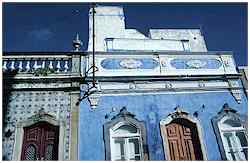HOME •
PORTUGAL •
DISCOVER PORTUGAL •
Culture •
Culture of Portugal
 CULTURE OF PORTUGAL
CULTURE OF PORTUGAL
Portugal is an ancient nation and for more than 1000 years it has maintained its specific culture through a self-governing venture while being influenced by the various civilizations that crossed the Mediterranean world. Thus, it has always absorbed habits and traditions from such early civilizations and from the regions that it discovered and conquered throughout the world during the Portuguese empire, establishing a specific legacy.
An example of this absorption and adaptation of previous culture is seen in the countless festivals to pagan local and Roman deities which were transformed into festivals to Christian saints; only some pagan festivals have changed little over 2,000 years, despite the religious passion of the Middle Ages and the inquisition.
Portuguese music is represented by a wide variety of forms. The most renowned Portuguese music is Fado, a form of melancholic music. The music is usually linked to the Portuguese guitar and the Portuguese word saudade. Although without an accurate equivalent in English, saudade is describable as a common human feeling; it occurs when one is in love with someone or something yet apart from him, her, or it.
The style conveys a distinct mixture of sadness, pain, nostalgia, happiness and love. Fado origins are probably from a mixture of African slave rhythms with traditional music of Portuguese sailors, with Arabic influence. There are two varieties of Fado; that of Lisbon and that of Coimbra. Lisbon Fado was primarily of popular origins, often performed by women, while Coimbra's Fado had a more literate vein and was often performed by men; both are nowadays seen as ethnic music appreciated abroad.
Some of its most internationally notable performers are Amalia Rodrigues, Mariza, Ana Moura, Mísia, Dulce Pontes, Madredeus, and Cristina Branco.
Currently, mainstream music in Portugal is in a rural and urban duality where the Portuguese pop-rock and hip hop tuga (a mixture of hip-hop, African music and Reggae, primarily performed by African-Portuguese) are popular with the younger and urban population, while pimba (a simple and cheery variety of folk music) and folklore are more popular in the rural areas.
Portuguese literature is one of the earliest western literatures, and it developed as the 13th century arrived, through texts and songs. And until 1350, the Portuguese-Galician troubadours spread their literary influence to most of the Iberian Peninsula.
The adventurer and poet Luís de Camões (c.1524 - 1580) wrote the epic The Lusiads, a work that he developed in his journeys in Africa and Asia. However, he was shipwrecked in Vietnam, and he saved himself and his work by floating on a board.
Modern Portuguese poetry, since the 19th century, is essentially rooted in a handful of relevant poets, ranging from neo-classicism to contemporary styles.
One such famous poet is Fernando Pessoa (1888 - 1935), who wrote poetry in the voice, style and manner of many fictional poets under a large number of heteronyms.
Modern literature also became internationally known, mostly through the works of Almeida Garrett, Alexandre Herculano, Camilo Castelo Branco, Eça de Queirós, Ferreira de Castro, Sophia de Mello Breyner Andresen, Herberto Helder, António Lobo Antunes and the 1998 Nobel Prize for literature winner, José Saramago.
Portuguese traditional architecture is distinct precisely due to the variety of influences it features, with several examples throughout the world, some of which are classified as world heritage sites. Modern Portugal has one of the best architecture schools in the world, known as "Escola do Porto" or School of Porto, renowned by the names of Souto Moura and Alvaro Siza.
Retrieved from Wikipedia.org, the Free Encyclopedia
 PORTUGAL TOURS & TRAVEL PORTUGAL TOURS & TRAVEL
 PORTUGAL HOTELS AND RESORTS PORTUGAL HOTELS AND RESORTS
HOME •
PORTUGAL •
DISCOVER PORTUGAL •
Culture •
Culture of Portugal
|
SEE ALSO FOR PORTUGAL:
•
PLACES TO STAY:
ALL HOTELS,
Algarve Hotels,
Albufeira Hotels,
LISBON Hotels,
Lisbon District Hotels,
Madeira Islands Hotels,
Porto Hotels,
Vilamoura Hotels,
•
TOURS & TRAVEL:
ALL TOURS,
Albufeira Tours,
The Azores Tours,
Faro Tours,
Funchal Tours,
LISBON Tours,
•
ATTRACTIONS, CULTURE & MORE:
LISBON:
Belem Tower,
Castle of Sao Jorge,
Jeronimos Monastery,
CULTURE:
Culture of Portugal,
Port Wine,
|
 Images of Portugal
Images of Portugal
FADO:
Fado is a music genre which most likely originated in the 1820s in Portugal. It is characterized by mournful tunes and lyrics, often about the sea or the life of the poor. The music is usually linked to the Portuguese word saudade, a word with no accurate English translation; it is a type of longing, and conveys a complex mixture of sadness, pain, nostalgia, happiness and love). Fado's origins are probably from a mixture of African slave rhythms with the traditional music of Portuguese sailors and Arabic influence.
|
|


 Images of Portugal
Images of Portugal

